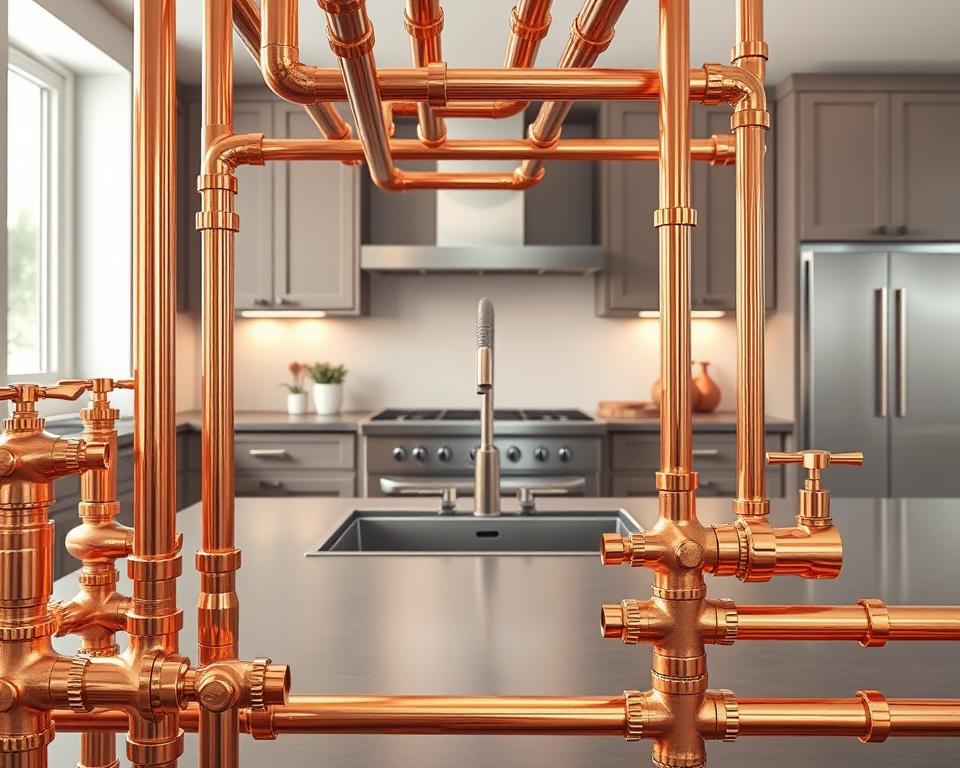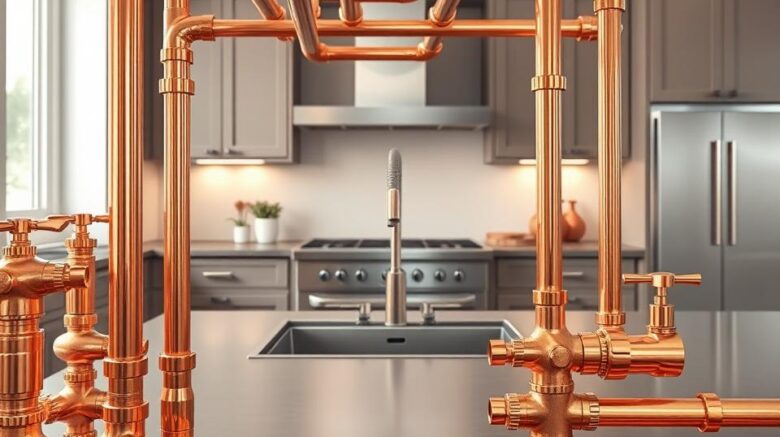Your Guide to Copper Water Line Sizing at Home
Did you know that nearly 30% of home plumbing issues stem from incorrectly sized piping? Selecting correct sizes guarantees peak water pressure and overall system performance. This guide helps homeowners understand the basics of sizing for residential projects.
Correct sizing hinges on elements such as flow rate needs and pipe wall thickness. Industry-standard copper tube sizes spans diameters from 1/4″ up to 8″, indicated by NPS (Nominal Pipe Size) versus true OD. Installation Parts Supply provides professional advice to align your home requirements with code-compliant options.
Copper remains a top choice due to its durability and corrosion resistance. Whether retrofitting your setup or installing from scratch, knowing these principles cuts downtime and avoids costly mishaps.
Summary Highlights

- Accurate sizing stops 30% of usual plumbing issues
- Common sizes run between 1/4″ and 8″
- NPS labels don’t match real outer diameters
- Right sizing preserves water pressure and performance
- Copper delivers strength and rust protection
- Professional guidance ensures code compliance
Why Choose Copper Pipes for Your Plumbing System?
Long-lasting plumbing begins by choosing the proper material—copper excels for these reasons. With over 50 years of service life and NSF drinking-water approval, it’s a favorite among homeowners. Different from other options, it marries toughness and eco-friendliness.
Durability and Corrosion Resistance
Resisting rust and chemicals by nature, copper outlasts PVC and PEX. Its smooth interior maintains water pressure by reducing friction. Practical tests confirm decades of leakless performance.
Installation Parts Supply stocks quality-certified options to match your project needs. While initial costs are higher, the long-term savings from fewer repairs justify the investment.
Adaptability and Frost Defense
In frost-prone areas, its minor freeze expansion helps avert pipe bursts. This give lowers the likelihood of pricey cold-weather failures. Use alongside suitable insulation for peak frost protection.
Sustainable and Germ-Fighting Properties
Copper is 100% recyclable, reducing environmental impact. Antimicrobial action curbs bacterial proliferation to boost water purity. Green-minded homeowners prefer it to plastic options.
Decoding Copper Pipe Dimensions and Varieties
Pipe sizing can baffle homeowners—this section clarifies it. Industry NPS labels don’t correspond to real outside measurements. For example, a 1/2″ NPS has an outer diameter of 0.625″.
Labeled vs. True Pipe Sizes
NPS numbers are labels, not exact measurements. Always check the outer diameter (OD) before purchasing. A conversion chart helps:
- 1/4″ NPS corresponds to 0.375″ OD
- 1/2″ NPS corresponds to 0.625″ OD
- 3/4″ nominal → 0.875″ actual
Comparing Types L, M & K
Three types copper dominate residential plumbing. Their wall thickness determines strength and use cases:
- Type L: Light gauge (0.040″ @ 1/2″), perfect for standard homes.
- Type M: Medium-wall (0.050″ for 1/2″), balances cost and durability.
- Type K: Heavy-wall (0.060″ for 1/2″), for high-pressure systems.
For versatility, Installation Parts Supply favors Type M in most setups. Larger diameters (over 2″) often require Type K for irrigation or commercial use.
Type L Copper: Lightweight and Flexible
For homeowners tackling DIY projects, L-type offers unmatched flexibility. Thin gauge lightens load and price yet stays robust. Available in rigid sticks or soft coils, it adapts to everything from HVAC lines to drain systems.
Common Applications and Limitations
Best suited to systems under low pressure. With 0.040″ walls, it’s great for:
- HVAC refrigerant lines
- Drain-waste-vent (DWV) systems
- Residential water supply (below 80 PSI)
Avoid high-pressure systems—thicker-walled alternatives like Type K handle those better. Soft coils (up to 50ft) simplify bending around obstacles but require careful handling to prevent kinks.
Sizing Options and Installation Tips
Sizes span 1/4″–8″, including:
| Form | Max Length | Best For |
|---|---|---|
| Rigid | 20ft | Straight runs |
| Coiled | 50ft | Tight spaces |
Installation Parts Supply recommends rigid forms for beginners—they’re easier to cut and solder. When tackling big installations, coils mean fewer joints, saving time and leak hazards.
Type M Copper: Balanced Performance
Moderate cost plus solid performance make M-type a homeowner favorite. Its medium-wall design handles everyday demands while keeping budgets in check. Approved by NSF for water and gas, it works in kitchens, baths, and heating.
Where M-Type Shines
Great for both hot and cold feeds, it sustains consistent water pressure. Rigid 12ft lengths suit straight runs, while 100ft coils adapt to tight spaces. Popular applications are:
- Drinking water distribution
- Medical gas lines (oxygen, nitrous oxide)
- HVAC refrigerant lines
M-Type Gauge & PSI Ratings
Sits midway between L and K in gauge and strength. With 0.050″ walls, it tolerates up to 150 PSI without failure. Compare key specs:
| Type | Wall Thickness (1/2″) | Max Pressure | Best For |
|---|---|---|---|
| L | 0.040″ | 80 PSI | Low-pressure DWV |
| M | 0.050″ | 150 PSI | Residential supply |
| K | 0.060″ | 200 PSI | Irrigation |
Installation Parts Supply stocks M-type in all standard sizes. Combine with proper flare connectors for gas lines to secure seals. Allow slight expansion gaps in hot water runs to accommodate thermal movement.
K-Type Copper: Maximum Strength
For ultimate robustness, choose K-type in rigorous settings. Heavy walls plus high PSI capacity suit it to industrial or buried lines. It withstands both compression and corrosion better than lighter gauges.
Heavy-Duty Use Cases
K-type thrives in extreme conditions. At 0.060″ gauge, it manages 200 PSI, ideal for:
- Underground irrigation systems
- Commercial HVAC refrigerant lines
- Fire sprinkler networks
When burying, Installation Parts Supply suggests at least 18″ cover. Combine with compression fittings torqued at 25 ft·lb to ensure leak-free performance.
How to Choose Rigid or Coiled K-Type
Choose the right form for your project. Rigid 12ft for long stretches; coils 50ft for complex paths. See their differences:
| Form | Best For | Limitations |
|---|---|---|
| Rigid | High-pressure mains | Requires more fittings |
| Coiled | Trenchless installations | Risk of kinks if bent sharply |
In irrigation layouts, allow 10% for thermal growth. Rigid sections require a bending tool to prevent efficiency-sapping kinks.
Copper Pipe Installation & Maintenance
Correct methods deliver years of drip-free operation. DIYers or professionals alike benefit from mastering these fundamentals. Use these approaches for solid, durable joints.
Connection Options Compared
Select the joining style that fits your task. Heat or compression yield permanent bonds; non-permanent lets you tweak later. See which suits you best:
| Method | Pros | Cons | Best For |
|---|---|---|---|
| Soldering | Strong, permanent | Requires skill | Water supply lines |
| Compression | No heat needed | Bulky fittings | Tight spaces |
| Push-Fit | Quick installation | Higher cost | Emergency repairs |
Step-by-Step Soldering Guide
To solder properly, proceed as follows:
- Thoroughly clean with emery cloth.
- Coat each piece evenly with flux.
- Apply torch heat until you hear the flux hiss.
- Apply solder to the seam; it will wick in automatically.
Always wear heat-resistant gloves and work in a ventilated area. Lead-free solder for potable lines is available at Installation Parts Supply.
Avoiding Drips and Freeze Breaks
Use foam insulation on pipes in cold spots. Use foam sleeves for pipes running through exterior walls. To fix minor issues:
- Inspect fittings yearly for green patina indicating leaks.
- Hang horizontal pipes at 32 inches intervals to avoid sag.
- Install freeze-proof faucets in cold climates.
Yearly checks spot small problems early. Have essential tools on hand—wrenches, cutters, Teflon tape handle most jobs.
Final Thoughts on Copper Pipe Selection
A thoughtfully designed plumbing network endures for years—here are the main points. Match your project’s needs with the right type and size for optimal durability. Don’t forget:
- Type M suits most homes, while K handles heavy-duty jobs
- Right sizing ensures steady pressure and leak prevention
- Freeze protection is critical in cold climates
Lean on Installation Parts Supply’s expertise to make selection easy. All products are certified and backed by quality assurances for flawless plumbing systems.
Need help? Download free sizing guides or schedule a consultation today. New customers enjoy special discounts—launch your project on the right foot!
